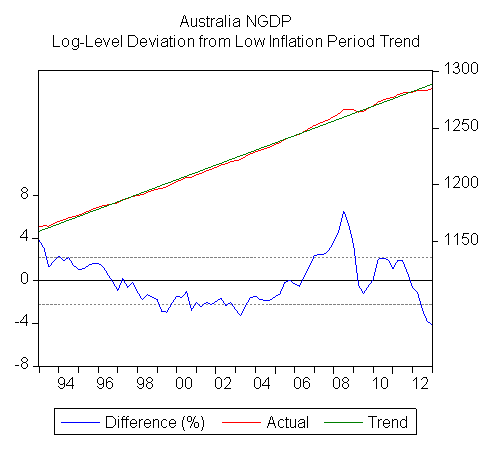2013 06
I have an op-ed in the Business Spectator arguing that Australian retailers are mistaken in arguing for a lowering of the low value exemption threshold for GST and duty on imports. Instead, retailers need to focus on their own business models and lobby for policies that lower the tax and regulatory burden on business.
posted on 24 June 2013 by skirchner in Economics, Free Trade & Protectionism
(0) Comments | Permalink | Main
The national accounts were out yesterday, so time to update our graph of the (log) level of nominal GDP relative to its low inflation period trend. The Australian economy still sits 4% below the NGDP level stabilisation benchmark suggested by the new market monetarists, implying that monetary policy has been too tight:

The new market monetarists argue Australia was a poster child for NGDP stabilisation during the financial crisis, but I interpret things differently. Prior to the onset of the financial crisis, inflation was out of control (CPI inflation running at 5%) and nominal GDP growth was running in the double-digits. The financial crisis saved the RBA from having to induce a domestic recession to bring inflation under control. The RBA was most successful when international conditions were doing the work for them.
Lest this look like the luxury of hindsight, I was arguing much the same thing in August 2008.
posted on 06 June 2013 by skirchner in Economics, Financial Markets, Monetary Policy
(2) Comments | Permalink | Main
The Centre for Independent Studies has released my new paper Time to Dump Australia’s Anti-Dumping System. The paper notes the multi-decade failure to have public interest considerations incorporated in the administration of anti-dumping in Australia:
The Productivity Commission argued that ‘the highest priority for reform of Australia’s anti-dumping system is to introduce consideration of the broader public interest.’ The commission (under its previous names) has been arguing for this position since at least 1985. This multi-decade failure to incorporate public interest considerations into Australian anti-dumping and countervailing law suggests the system is unlikely ever to serve the public rather than private producer interests. The government’s rejection of the commission’s proposal for even a bounded public interest test ensures that Australia’s anti-dumping system will continue to serve the interests of a small number of Australian producers at the expense of other Australian businesses and consumers. The ‘reforms’ implemented by the federal government and supported by the federal opposition set the stage for creeping protectionism via anti-dumping actions that will impose growing costs on the Australian economy. This is part of a broader trend on the part of the federal government to extend assistance to Australian industry at the expense of consumers and taxpayers, and to stand in the way of a structural adjustment in the Australian economy.
The public interest will be best served by repealing the anti-dumping and countervailing provisions of Australian law and dismantling the associated bureaucracy within Customs. This was a recommendation of the 1989 Garnaut review that remains un-implemented nearly a quarter of a century later. Doing so would send a powerful signal to Australian industry that it must adapt to the structural changes in the world and domestic economies rather than going cap-in-hand to the federal government for assistance at the expense of consumers and taxpayers.
Australia can also set a powerful example on the world stage as a country that prospers because it has abandoned recourse to these protectionist measures.
posted on 05 June 2013 by skirchner in Economics, Free Trade & Protectionism
(0) Comments | Permalink | Main
|

